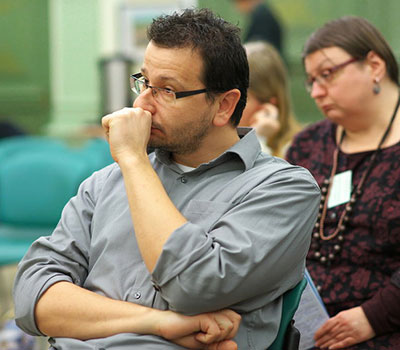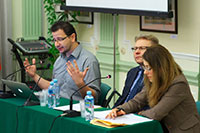 The conference was organized by St Andrew’s Biblical Theological Institute (Moscow), Vrije University (Amsterdam) and Pokrovskie Vorota Cultural Center (Moscow). Topics focused on re-examining religious consciousness, as something that depends on historical, cultural and political contexts, and may experience drastic changes over time. Speakers discussed religious consciousness in so-called “post-secular” times, in which religious perception is largely shaped by ideas coming from science, popular culture, mass media and other fields. Being affected by different aspects of contemporary life, religious consciousness is becoming a very complicated and tangled phenomenon.
The conference was organized by St Andrew’s Biblical Theological Institute (Moscow), Vrije University (Amsterdam) and Pokrovskie Vorota Cultural Center (Moscow). Topics focused on re-examining religious consciousness, as something that depends on historical, cultural and political contexts, and may experience drastic changes over time. Speakers discussed religious consciousness in so-called “post-secular” times, in which religious perception is largely shaped by ideas coming from science, popular culture, mass media and other fields. Being affected by different aspects of contemporary life, religious consciousness is becoming a very complicated and tangled phenomenon.
Professor Džalto’s presentation examined the question: “What does it mean to be a Christian in the post-secular society?”
The presentation addressed some of the most basic questions related to the religious/Christian identity:
- Is it, and to what extent, necessary to follow certain practices (such as religious rituals) in order to exercise one’s religiousness?
- What is the significance of institutional belongings and “prescribed” practices, as factors that build up someone’s religious identity?
- How do we make sense of the “inner” set of beliefs and knowledge as important (and often neglected) aspects of being a religious person?
- What is the significance of the “letting others to believe for me” phenomenon for the articulation of contemporary (both Christian and non-Christian) religiosity?
Many of these questions are examined in AUR’s Master’s program Peace Studies: Religion in Times of Conflict which looks at understanding religious and cultural history as the foundation for building peace and cross-cultural understanding in today’s world. For more information on this innovative program, visit: https://graduate.aur.edu/program/ma-peace-studies

